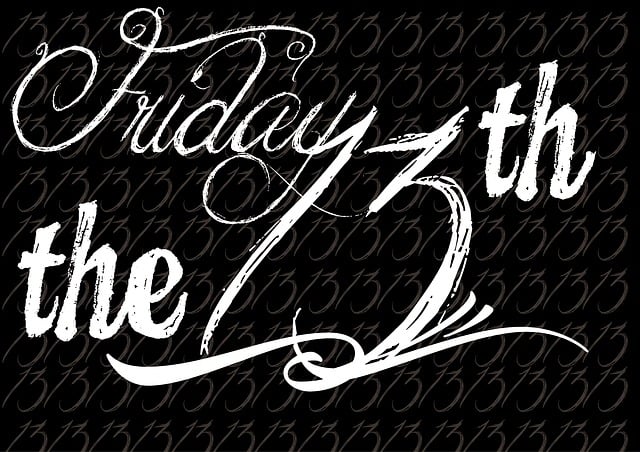Friday the 13th has long been associated with superstition, mystery, and even fear. Whether you’re superstitious or not, there’s no denying that this day has garnered a notorious reputation. Throughout the centuries, Friday the 13th has been feared, revered, and examined from numerous cultural, historical, and psychological perspectives. But why exactly is this date so peculiar, and what are some of the lesser-known facts about it?
Let’s take a deep dive into the origins, global significance, and lesser-known facts about Friday the 13th, uncovering why it still holds such fascination today.
The Origins of Friday the 13th’s Bad Reputation
While the exact origin of Friday the 13th’s unlucky nature is murky, both the number 13 and the day Friday have individually been regarded as unlucky in Western cultures for centuries. The combination of these two elements forms a day of heightened misfortune.
Friday
Friday has long been considered an unlucky day in many cultures. In Christianity, it is believed that Jesus Christ was crucified on a Friday, a fact that contributes to the day’s somber reputation. The Bible also recounts that Adam and Eve ate the forbidden fruit on a Friday, leading to their expulsion from the Garden of Eden.
Sailors, too, have historically avoided embarking on voyages on Fridays, believing that doing so would result in bad luck. This fear of Friday was so pronounced that in the 19th century, British authorities tried to debunk the superstition by launching a ship named HMS Friday. According to legend, the ship set sail on a Friday, under the command of Captain Friday — and mysteriously vanished, never to be seen again.
The Number 13
The number 13 has been associated with misfortune for much of recorded history. In Norse mythology, there’s a tale of a dinner party with 12 gods that was disrupted when Loki, the trickster god, showed up uninvited as the 13th guest. His arrival led to chaos and the eventual death of the beloved god Balder, casting a shadow over the number 13.
In Christianity, 13 is also viewed with suspicion because there were 13 guests at the Last Supper — Jesus and his 12 apostles — and Judas, the betrayer of Christ, was said to be the 13th guest.
How Did Friday the 13th Become Linked?
The combination of Friday and the number 13 as a doubly unlucky day seems to have arisen sometime in the 19th century. The earliest documented reference to the fear of Friday the 13th is found in Henry Sutherland Edwards’ biography of Gioachino Rossini, an Italian composer who died on Friday the 13th. Edwards mentions that Rossini, like many Italians of his time, considered Friday an unlucky day and 13 an unlucky number.
The term Friday the 13th itself became more widely known after the publication of Friday, the Thirteenth by Thomas W. Lawson in 1907. The novel tells the story of a stockbroker who uses superstition to manipulate the stock market, leading to widespread panic. Since then, Friday the 13th has cemented itself as a day associated with misfortune and superstition.
Scientific Explanations for the Fear of Friday the 13th
While Friday the 13th is steeped in folklore, there’s also a psychological component to the fear of this day. The fear of Friday the 13th is so widespread that it even has a clinical name: friggatriskaidekaphobia or paraskevidekatriaphobia, both of which refer to the irrational fear of Friday the 13th.
The Power of Expectation
One theory suggests that Friday the 13th is a classic example of the self-fulfilling prophecy. Those who believe the day is cursed might subconsciously seek out (or create) situations that confirm their belief in its bad luck. Whether it’s minor inconveniences like spilling coffee or larger issues like car trouble, people might attribute their misfortunes on this day to the superstition, even though similar events might happen on any other day.
Confirmation Bias
Psychologists have also suggested that confirmation bias plays a role in how people perceive Friday the 13th. This cognitive bias leads individuals to remember information that confirms their pre-existing beliefs and overlook information that contradicts them. If someone believes that bad things happen on Friday the 13th, they are more likely to notice and remember negative events, reinforcing the idea that the day is indeed unlucky.
Not Every Culture Fears Friday the 13th
While Friday the 13th is considered unlucky in many Western cultures, it’s not a universal belief. In fact, different cultures have their own unlucky days and numbers, some of which may surprise you.
Tuesday the 13th (Spain and Latin America)
In Spanish-speaking countries, Tuesday the 13th (martes 13) is traditionally viewed as a day of bad luck rather than Friday. The reasoning behind this superstition is tied to both the number 13 and the god of war, Mars, for whom Tuesday is named. Mars symbolizes destruction, war, and bloodshed, making Tuesday a particularly ominous day in Latin cultures when it falls on the 13th.
Friday the 17th (Italy)
In Italy, the number 13 is actually considered lucky! However, Italians do fear Friday the 17th. The fear stems from the Roman numeral for 17, XVII. When rearranged, the letters form the Latin word VIXI, which translates to “I have lived” — an ominous phrase suggesting death. As a result, Italians tend to avoid the number 17, and Friday the 17th is a day regarded with caution.
Notable Friday the 13th Events
Despite the fact that most Friday the 13ths pass without incident, there have been a number of strange or unfortunate events tied to this day that continue to feed its eerie reputation.
The Knights Templar Arrests
One of the most famous historical events associated with Friday the 13th is the mass arrest of the Knights Templar in 1307. The Knights Templar, a powerful and wealthy medieval Christian military order, were accused of heresy by King Philip IV of France, who coveted their wealth. On Friday, October 13, 1307, King Philip ordered the arrest of hundreds of Templars. Many of them were tortured and executed, and the order was disbanded. Some historians argue that this event contributed to the bad reputation of Friday the 13th, although the connection is debated.
The Andes Flight Disaster
On Friday, October 13, 1972, Uruguayan Air Force Flight 571 crashed in the Andes Mountains. Of the 45 passengers, only 16 survived, thanks to their resourcefulness in the face of extreme conditions. The story of their survival, including how they resorted to cannibalism, was later made into a book and movie titled Alive.
The Death of Tupac Shakur
Iconic rapper Tupac Shakur died on Friday, September 13, 1996, after being fatally wounded in a drive-by shooting in Las Vegas. His death has since been surrounded by mystery, conspiracy theories, and continued fascination, further adding to the lore of Friday the 13th.
Friday the 13th in Popular Culture
Friday the 13th has also made its mark in popular culture, particularly with the famous horror movie franchise Friday the 13th, which debuted in 1980. The series features the infamous villain Jason Voorhees, a hockey mask-wearing killer who haunts the seemingly cursed Camp Crystal Lake. The success of the franchise has only cemented Friday the 13th’s association with horror and fear in modern pop culture.
Beyond horror films, Friday the 13th has been referenced in literature, television, and even music. Musicians such as Black Sabbath have released albums on the date, and the day often inspires special episodes of TV shows, further contributing to its mystique.
How People Cope with Friday the 13th Superstition
Despite the ominous reputation of Friday the 13th, not everyone succumbs to the superstition. In fact, some people go out of their way to debunk it or use the day to poke fun at superstitions in general. Skeptic organizations often use Friday the 13th as an opportunity to promote critical thinking, emphasizing that fear of the day is based more on tradition and myth than on any real danger.
At the same time, some people prefer to avoid the day altogether. Studies have shown that a portion of the population — particularly those who suffer from friggatriskaidekaphobia — might stay home, call in sick, or refrain from traveling on Friday the 13th to reduce their chances of misfortune. While there is no statistical evidence to prove that accidents or disasters occur more frequently on this day, the fear remains very real for many.
The Relationship Between Menstrual Cycles and Friday the 13th
Interestingly, Friday the 13th has also been linked to a unique cultural and biological phenomenon: the menstrual cycle. While the connection between menstruation and Friday the 13th might not be immediately obvious, some scholars and historians have drawn parallels between the number 13, lunar cycles, and ancient beliefs about femininity.
The Number 13 and Lunar Cycles
One of the most compelling reasons for the association between the number 13 and menstruation is the relationship both have with lunar cycles. The moon, which has been closely tied to femininity and fertility throughout history, takes roughly 29.5 days to complete a full cycle from new moon to new moon. In a calendar year, there are typically 12 full lunar cycles — but every so often, a 13th cycle occurs. The presence of 13 lunar cycles in a year has long been regarded with reverence and, in some cultures, even seen as mysterious or unlucky.
Menstrual cycles typically range from 28 to 30 days, closely mirroring the lunar cycle. Over the course of a year, many women will experience 13 menstrual cycles, particularly if their cycles are on the shorter end of the spectrum. In ancient cultures, this synchronicity between the number 13 and the menstrual cycle lent the number a mystical, feminine quality. The association between the moon, fertility, and the feminine form contributed to a broader cultural reverence — and sometimes suspicion — of both the lunar cycle and the number 13.
Friday and the Divine Feminine
Friday, too, has connections to femininity in certain traditions. For many cultures, Friday is named after a goddess, particularly one associated with fertility, love, and the divine feminine. In Roman mythology, the day was dedicated to Venus, the goddess of love and beauty. In Norse mythology, Friday was named for Frigg (or sometimes Freya), the goddess of fertility, love, and motherhood.
The convergence of Friday, the day of the goddess, and the number 13, associated with lunar and menstrual cycles, has given rise to speculation that Friday the 13th may have once been a day of celebration for women and the divine feminine. Some feminist scholars suggest that the fear of Friday the 13th is rooted in patriarchal attempts to suppress female power and natural cycles, transforming what was once a day of reverence into one of fear and superstition.
Modern Perspectives on the Menstrual Cycle and Friday the 13th
While the connection between Friday the 13th and menstruation may not be widely known today, the day remains a time for reflection on the often-hidden power of natural cycles. Some modern movements, particularly within feminist and spiritual communities, have embraced Friday the 13th as a time to honor the body’s natural rhythms, especially menstruation. These groups see Friday the 13th not as a day of misfortune, but as an opportunity to reclaim and celebrate the divine feminine.
Beyond feminist movements, some holistic health practitioners also note the importance of being mindful of the body’s natural cycles and rhythms on Friday the 13th. Whether or not there’s a tangible connection between menstruation and Friday the 13th, the synchronicity between the lunar and menstrual cycles is undeniable. And in a world where Friday the 13th is often viewed with fear or superstition, it’s refreshing to consider that, historically, it may have been a day for celebrating life, fertility, and feminine strength.
Just Another Day? Or More?
Friday the 13th may be laden with myths, superstitions, and fears, but it’s also rich with history and deeper meanings that go far beyond the surface. The relationship between menstruation, lunar cycles, and the number 13 offers a new perspective on the day, suggesting that Friday the 13th is more than just a day of bad luck. Whether we view it as a symbol of doom or a chance to honor the mysteries of life, Friday the 13th invites us to examine our beliefs, question our fears, and perhaps even reclaim it as a day of empowerment.
So, whenever Friday the 13th rolls around, rather than succumbing to fear or avoiding black cats and ladders, consider looking to the sky and reflecting on the powerful rhythms that govern our world — and your own place within them.
Publisher: Source link











